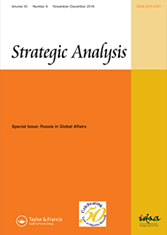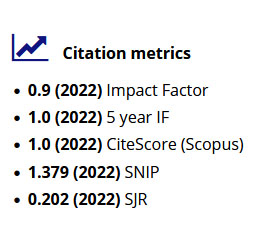Strategic Analysis


Strategic Analysis is the bimonthly journal of the Manohar Parrikar Institute for Defence Studies and Analyses (MP-IDSA), New Delhi. It is published by Routledge, an imprint of the Taylor & Francis Group, United Kingdom.
For subscription and other details, please visit the Routledge website
The Journal provides a forum for independent research, analyses, and commentaries on national, regional and international security issues that have policy relevance. It seeks to promote a better understanding of Indian thinking on contemporary national and international themes. The Journal reflects a diversity of views from the strategic and international relations studies community both from within and outside India. The flagship in the IDSA stable of publications, Strategic Analysis began as a monthly journal in April 1977 and served as a medium for publishing commentaries on current events. From early 1987, its contents came to include both research articles as well as commentaries on national and international developments. It was transformed into a quarterly, refereed, journal in 2002. Routledge has been publishing the journal in a bi-monthly format since January 2007.
Scholars and analysts are welcome to submit well-researched papers for publication in this refereed journal.
Submissions should be directed to Ms. Rashi Garg, Associate Editor at strategicanalysis.idsa@gmail.com
Guidelines for contributors [+]
Current Issue: May-June 2025
The latest Issue of Strategic Analysis (Vol. 49 Issue 3, 2025) brings together a set of articles that examine a wide spectrum of contemporary strategic issues. The lead article ‘Prioritising Human Development: A Blueprint for the World from India’s Journey from Pre-MDG Successes to SDGs’ traces India’s long and often underappreciated trajectory in advancing sustainable development, underscoring how its national priorities were closely aligned with the global development agenda well before the advent of the Millennium Development Goals (MDGs). The other contributions in this Issue examine India’s approach to deep de-carbonisation and its responses to evolving landscapes, situating these debates within the context of shifting global economic and strategic dynamics.
The Strategic Essay on India’s Neighbourhood First Policy traces the genealogy of India’s neighbourhood engagement from the colonial period through its evolution under Jawaharlal Nehru and across successive Congress and non-Congress governments. It offers a critical assessment of the policy’s functioning under the Modi government and outlines pathways through which India can sustain and consolidate its influence in the neighbourhood.
The From the Archives section highlights the enduring relevance of earlier strategic assessments, showing how attempts at ‘Negotiating with Pakistan’ since the 1965 war, in the aftermath of later attacks such as Uri, Pulwama and Pahalgam have remained trapped in a persistent deadlock. In this context, the analyses underscore how calibrated military responses have increasingly come to be viewed as the only viable option in contemporary times.
Archives [+]




